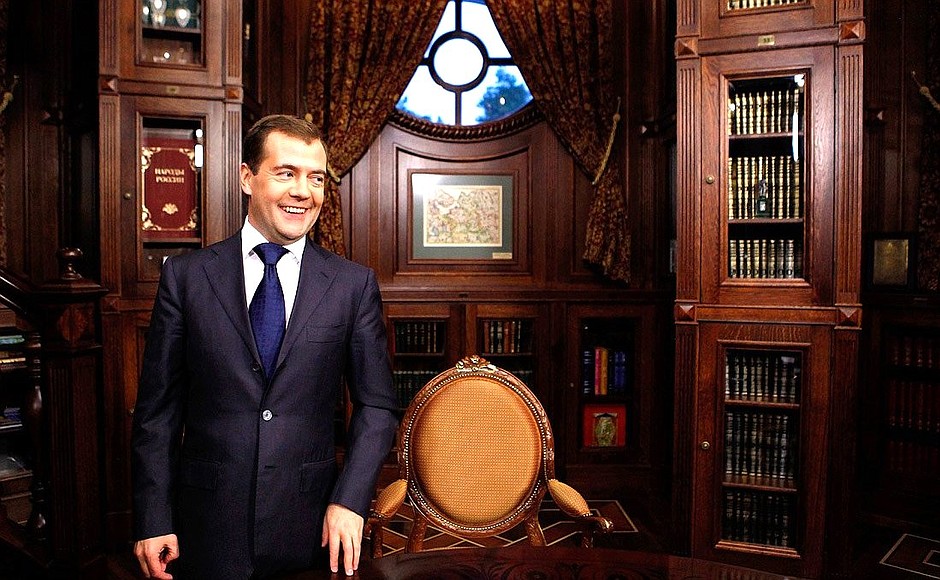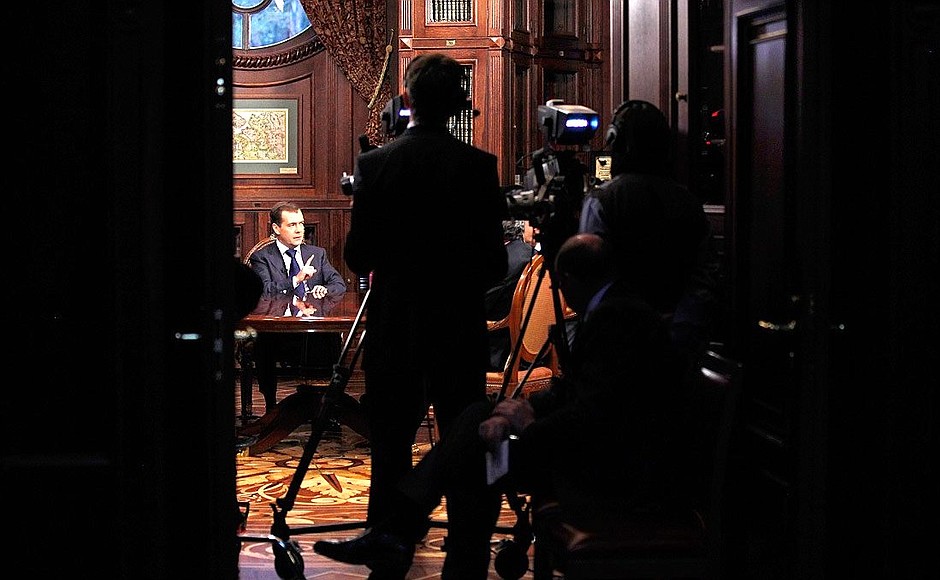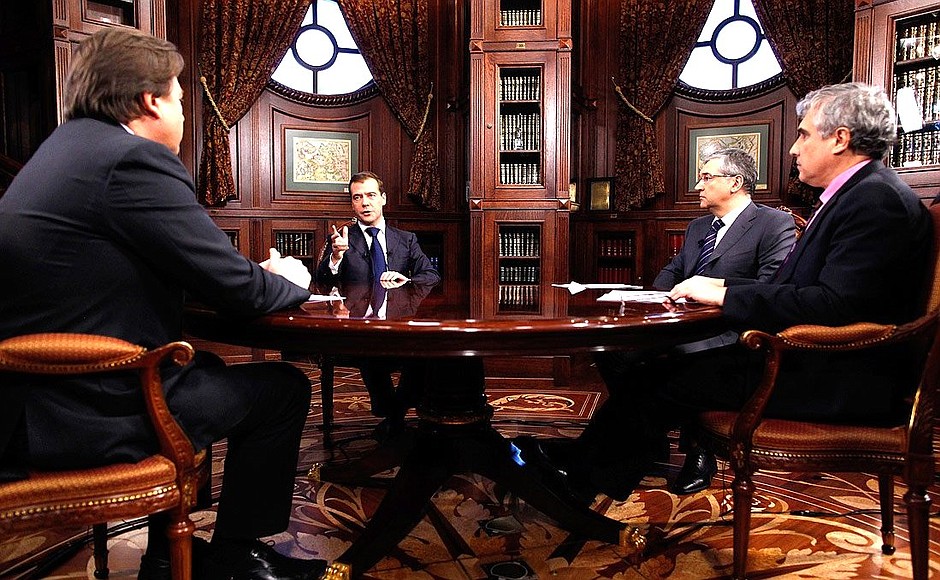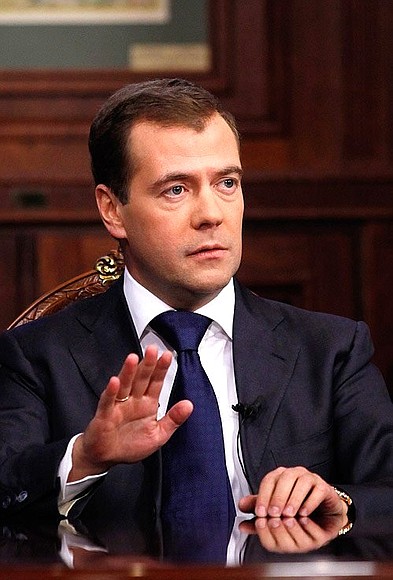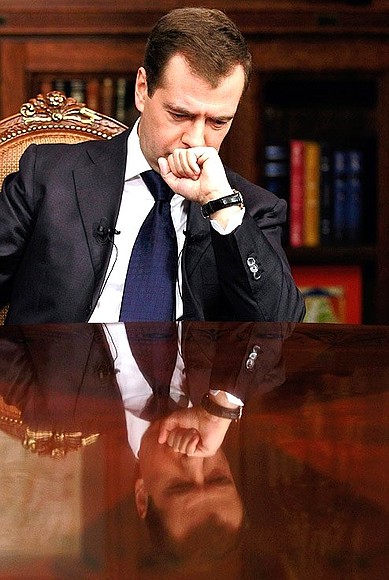General Director of Channel One Konstantin Ernst: Mr President, last week the big domestic political news that everyone had long been waiting for finally took place at the United Russia party congress, when you proposed that Vladimir Putin run for the office of president in next year’s election. Many people wonder what exactly motivated this decision of yours. Your public confidence ratings are high. You are a young and active politician with a good reputation. So, what was the main motive behind your decision? Usually, whoever holds the president’s office makes use of the opportunity to run for a second term. You are in politics, and politicians are ambitious people, so, how do you explain your ambitions here?
President of Russia Dmitry Medvedev: My biggest ambition is to be of use to my country and people. I know this might sound rather high-flown, but it is the honest truth. If you have no ambitions, politics is not really the place for you, and you’d be better off putting your efforts into something other than political activity and state administration.
As for my motivations, they are clear, but at the same time they are always cause for discussion. Let me stress the point that both Vladimir Putin and I want above all to serve our homeland, serve our country. We represent the same political force. We were both nominated to run for president by the same party – United Russia. When I was nominated, it was Vladimir Putin who headed the party list, and now it is I who heads this list. And so we both represent one and the same political force.
”My biggest ambition is to be of use to my country and people. I know this might sound rather high-flown, but it is the honest truth. If you have no ambitions, politics is not really the place for you, and you’d be better off putting your efforts into something other than political activity and state administration.“
We are different people of course, each with our own habits and manner, but at the same time, as people representing one and the same political force, we are very close in our ideas and share very similar positions on most of the strategic issues before the country, on all of the strategic national development issues, you could say, and on the tactical matters too. So, if you look at things from this point of view, what reason could we have to compete against each other? What reason could we have to quarrel and argue with each other? I read various political analyses saying things like, “What, they are not going to both take the political stage and battle it out to the bitter end, stage a competition between themselves? How can this be?” But you don’t see this kind of thing in any country. People who are part of the same political force choose together who to put forward and how to proceed. In some places this takes the form of primaries. We have begun trying out this method and with good results so far. In some places, these matters are decided by party congresses and the party leaders themselves. Can you imagine a situation where Barack Obama, say, starts competing against Hillary Clinton? They both sought nomination as their party’s candidate for president. This kind of rivalry just wouldn’t be possible. They represent the same party, the Democratic Party, and their decisions were based on which candidate they thought would bring the best result. We made our decision in this same manner. Of course I am happy to see that, as the incumbent president, I have a good public confidence rating and decent popularity rating among the voters. But at the same time, I am aware that Prime Minister Putin is uncontestably the politician with the most prominent standing in our country at the moment, and his rating is a bit higher than mine. Everyone seems to miss this point for some reason, and yet these are very practical and important considerations that any politician must take into account if he wants to be of real use to his country and not just shove and jostle for power at the top.
People often seem to be just waiting for us to fall out at some point and start actively challenging each other on the political stage. I often hear such things from the opposition and from some political analysts, in any case. But let me tell you that this will not happen. We want to achieve political goals, win the parliamentary election in December, and the presidential election next March, and not satisfy our own ambitions. Again, I stress the point that for a responsible person the biggest ambition is to be of service to their country.
General Director of Russian State Television and Radio Broadcasting Company Oleg Dobrodeyev: You have given quite a few interviews over these last months. Asked about your plans for 2012, you said on a number of occasions that you do not exclude the possibility of taking part in the presidential campaign. What was that all about? Were you really considering the possibility, or did you just not want to announce the decision you and Putin had reached, did not want to give any hints yet as to what this decision would be?
Dmitry Medvedev: I want to give you and all of our people as open and honest an answer as I can. You must remember that our job is practical politics and real state administration. Everything in life can change. Yes, we formed an idea quite a while ago of how the power configuration would look if people continued to give us their confidence in 2011 and 2012. This is the truth, and we spoke about this at the United Russia party congress. But at the same time, life can always spring changes on us and alter things in sometimes paradoxical fashion. What if voter preferences had changed for whatever reason? This was something I also had to take into account. Vladimir Putin and I hold the two highest offices in the country – the posts of president and prime minister – we are ordinary people and have a duty to support and back each other. I was not deceiving anyone when I said the things I did, because life can indeed make sudden changes to any plans and scenarios. At the same time, yes, we did already have an agreement between us. I think that in every situation, now and in the future, if we succeed in carrying out our plans, we need to think about the future too, think about what we would do, what line we would follow in even the most complex circumstances, even situations are impossible to fully imagine and predict. This is why I said the things I did.
General Director of NTV Television Company Vladimir Kulistikov: Mr President, coming back to the United Russia party congress, one thing that really stood out for me was the amazingly huge number of people there.
Dmitry Medvedev: We are learning from our colleagues abroad.
Vladimir Kulistikov: Yes, the event did have a celebratory pomp not typical for our country with all those cameras whizzing about, banners, flags and so on, but at the same time, there was a very friendly and warm atmosphere there, a spirit of what I would even call political intimacy. At the round tables, people talked about the problems most on their minds. They would forget something, take out their notes, continue, and it all only made the whole thing better. The apotheosis came when these two highly respected figures took the stage and announced that they had agreed on who would have which of the country’s two highest offices. Many people, watching this all unfold, said to themselves, “Well, if everything is already decided, why bother wasting money on elections?” Indeed, what is the point of holding elections if everything is already decided?
Dmitry Medvedev: First of all, I agree that a very warm atmosphere prevailed at the congress. I attended a number of different events, and this kind of atmosphere is not something you can just imitate. No matter what people might say, no matter what the associations the congress perhaps raised in their minds, there really was a warm and open spirit there, and that is undeniable.
As for the next point you made, I think that this kind of logic is totally irresponsible, manipulative, and even provocative. The election campaign is only just beginning. Let’s ask ourselves one simple question. How would we look at the party congress’ decisions if the voters do not in the end give their votes to Medvedev and Putin? After all, the decision of the congress is just the party’s recommendation to support these two candidates in the elections, but it is the voters who make the ultimate choice. These are not empty words; this is the reality. Any party and any politician can fail in the elections. We have seen numerous such examples in our country’s history and that of other countries. No one is guaranteed against defeat in elections. So how can we say that everything has already been decided?
Of course, if we, say, struck a deal with Gennady Zyuganov, Vladimir Zhirinovsky, Sergei Mironov and other esteemed colleagues that they would not run in the elections and only we great souls would take part, this would indeed be just an imitation election. But they are going to take part in the elections, in December and in March. Their parties will take part in the parliamentary election, and they have presidential ambitions too. It is for the voters to decide which figure will be best for the country. Only the voters, only our people have the power to make the final choice by giving or not giving their support to this or that party or politician. This is what democracy is all about.
Konstantin Ernst: Mr President, you have accepted to head United Russia’s federal list. How active a part will you play in the election campaign, and with what people and platform will United Russia enter this campaign? Do you expect to see a tough-fought campaign ahead?
”It is for the voters to decide which figure will be best for the country. Only the voters, only our people have the power to make the final choice by giving or not giving their support to this or that party or politician. This is what democracy is all about.“
Dmitry Medvedev: Yes, United Russia has asked me to head the party list. This was an important choice for me, first of all because it was United Russia that nominated me as candidate for president, and second, because United Russia has been together with me all of this time, supporting my initiatives as president. United Russia is therefore the political party I feel closest too. This is a very big decision that the party has made, and it is a big responsibility for me as President. Of course I hope for success and expect the voters to make their choice known at the elections.
At the same time, I am the incumbent president and I have many duties to attend to both at home and abroad. I will certainly not be taking any holidays, therefore, and will not be pursuing any separate campaign programme. People can judge the president and government’s work by their actions. If they think the country is developing as it should and we are doing the right thing, they will vote accordingly. If they think we are not following the right course, they will vote for someone else. This too is democracy. Of course I will carry out my responsibilities. And yes, I think the campaign will be intense and the battles will be fierce, but, I hope, also within decent limits. We have the laws we need to make sure that these limits are respected.
Oleg Dobrodeyev: Mr President, I have a question that I am sure will be of interest to many specialists in political local history.
Dmitry Medvedev: Political local history?
Oleg Dobrodeyev: Yes, political local history specialists. Why was this decision, which was the subject of so much speculation, announced now and not, say, after the parliamentary election results become known? We all know what things are like here, after all, and know what kind of stupor overcomes all of the civil servants the moment they learn of decisions such as these. Don’t you think there is a danger that administrative and civil service life in Russia will just grind to a halt over this time?
Dmitry Medvedev: This would be terrible. Everyone has to keep working like clockwork right up until the current government and current president come to the end of their terms. It is indeed important to choose the right moment to announce decisions such as these, because otherwise, officials and bureaucrats can go a bit crazy – this kind of thing happens. I think that we chose the right moment – not too soon, and not too late. But at the same time, we do have to make sure that everyone keeps working as they should, working hard and responsibly, not playing at petty politics, but keeping the country running. This is the duty of the president, the government, and the other state bodies.
Vladimir Kulistikov: But all the same, Mr President, a lot of people feel bored now that the suspense is over. True, they weren’t bored for long, because Kudrin’s dismissal came along as a bolt out of the blue. So he didn’t respect discipline, broke the rules, but at the same time, it looks like a cunning campaign trick – remove a tight-fisted finance minister who doesn’t want to give money to farmers and soldiers. When you’ve got an election campaign coming up, you no doubt need someone willing to open the coffers. So, how much of Kudrin’s dismissal can be put down to breaches of discipline, and how much to differences in opinion? Did you really have any fundamental differences in opinion with him?
Dmitry Medvedev: I already commented publicly on this decision, already spoke live on the issue. As far as differences between us are concerned, looking at them from the legal point of view, and it is only in legal terms that we can judge them, all of the budget spending commitments, including defence spending and military pays were decided by the Government of course, and approved by all of the officials responsible, and Mr Kudrin also put his signature to all of these decisions.
I think one needs to be completely honest in this kind of situation: either you block these spending commitments because you think they are harmful for the country for whatever reason, but if you approved them, then how can you start to backtrack on decisions that you yourself approved?
Mr Kudrin’s case is therefore one of government discipline and that is all there is to it. We do not have a coalition government in Russia. We have a presidential, not a parliamentary republic. We have a presidential government that implements the course the president sets. Whoever does not agree can leave the government. This is the only option. This is a tough and unambiguous position, and I will continue to follow this line. I am sure that no matter who heads the country, they will continue to follow these principles.
As for Mr Kudrin, I have the impression he simply spent too long in one and the same job and perhaps was starting to get bored. He came to me back in February or March and said that he realised that there was no sense in him working in the next government [formed after the elections] and that he had been working as finance minister for a very long time now. Incidentally, he did not know about the proposals and configuration that we proposed at the United Russia congress. And so, he had been under no illusions in this respect for a long time now. All of these statements thus came as a great surprise for me. Anyway, the decision has been made now. As for Mr Kudrin’s future, he is a competent and experienced specialist and will find work and be of use to the country.
Konstantin Ernst: Mr President, many people see you as a supporter of liberal ideas in Russia and the world in general. But recently, people have been saying that the whole liberal vector faces a somewhat unclear future, especially after the whole affair with [Mikhail] Prokhorov. What went wrong with the Right Cause party, in your view, and what prospects do you see for carrying out the ideas it supports in Russia?
Dmitry Medvedev: I think that Right Cause, unfortunately, has chronic bad luck with finding a responsible leader. No matter how you look at things, after all, so much in a party’s success depends on its leaders. Right Cause has had bad luck. Of course, these recent events have certainly weakened the party. I remind you that I am heading a different party’s list, and so I do not want to comment on Right Cause’s problems and situation. I will say just one thing: my view and the view of United Russia, which, as I said at the congress, is a generous party, is that our parliament should reflect the full spectrum of our voters’ preferences. People representing the left, the centre, the liberal right, the conservatives, the democrats – they should all have their place. In short, everyone who has influence and for whom voters want to cast their votes should have a place. A parliament that represents the people’s various views is much more legitimate. That is my answer to your question.
Vladimir Kulistikov: Mr President, many people think that our society has not formed the social base for a liberal-right party because we do not yet have such a well-developed class of property owners, or middle class, or whatever term we give it. If there is a developed support base somewhere, it is in the internet. You no doubt have seen for yourself that the Prokhorov affair, Kudrin’s dismissal, and the decision of United Russia congress did not get much of an enthusiastic reception in the blogosphere.
As an active internet user, do you feel pressure from the blogosphere? Perhaps you are already responding to some of the comments people visiting your site have left, or perhaps you’d like to say something to them now?
Dmitry Medvedev: If I felt pressure in the direct sense of the word it would be very hard to work as President. But you are right in that I do pay a lot of attention to the internet. To be honest, the United Russia congress, the problems in Right Cause, and Mr Kudrin’s dismissal have all stirred a wide variety of reactions. Some people are lamenting the end of democracy, while others are clapping their hands in glee and saying, “Oh, finally, go for it, turn the screws tighter.” The blogosphere reflects the views of a huge number of different people. Naturally enough though, there are more young people than older people in the blogosphere and the internet in general, and this also helps to explain the popularity of particular views.
I think it is good that the internet, the blogosphere, and social media react to all of these things. This shows that what we are doing meets with a real response. People respond in different ways, take different positions, but this is all part of what you could call modern direct democracy, twenty-first century democracy. Internet vote results are not binding in any way for the state at the moment. They are not representative because supporters of liberal ideas, say, rarely spend their time on left-wing parties’ sites, and communist supporters, say, probably don’t spend their time reading Live Journal or other sites where more liberal views tend to predominate. But it is very good that all of these different views exist, and I think that the authorities in general, not under pressure, but as a natural choice, should respond to what goes on in the internet, take a modern outlook and take into account the various views expressed, including in the internet. This is essential for politicians at every level in today’s world.
Oleg Dobrodeyev: Carrying on from Mr Kulistikov’s question, would you agree that a worrying trend has emerged in society of late, namely, that the public feels alienated from politics and the authorities, that the ‘social lift’ is not working well enough, and they are always seeing one and the same faces on TV?
Vladimir Kulistikov: Our faces for example.
Oleg Dobrodeyev: Yes, our faces too.
Dmitry Medvedev: Your faces. Not ours.
Oleg Dobrodeyev: It’s been going this way for a good decade now, and regardless of how successful particular companies or managers are, I don’t want to repeat Ivan the Terrible’s advice to “change people around more often,” but at the same time, there is an impression that Russia has gone into a sort of personnel stagnation. How, in your view, can we fulfil people’s demand for the emergence of strong new figures in the country?
”The government must undergo renewal. And so, if our voters, our people vote for our presidential candidate, then I would be entrusted with forming the next government, and it would be a thoroughly renewed government made up of new people. I consider this principally important.“
Dmitry Medvedev: First, on public weariness, this is something I think about quite a lot because I am one of those people who, for reasons of duty, get shown often on television and talked about a lot in the media in general. Mr Dobrodeyev, you’ve been in the media a long time, but you still remember how we all watched the news broadcasts in the early 1990s, how we were simply glued to our TV sets, absolutely riveted by the Congress of People’s Deputies, in particular, following it for hours. It was far more interesting than any movie or TV series. But I think that kind of situation reflects troubled times. The better off people are in their everyday lives, the less attention they tend to give to all of these political events. This is because they tend to be more or less happy with the current state of affairs. But they should not become indifferent of course. People should go to the polling stations and vote for the party of their choice. I think this is the constitutional duty of any citizen who is not indifferent to their country’s future.
I don’t have the impression that our public has reached this kind of indifference and weariness. I hear people say sometimes that our lives have degenerated into constant entertainment, and television these days is all about entertainment too. But what do you want, TV like it was in 1993? To be honest, I do not want to go back to that. But perhaps some people do want that, and they are entitled to this view, our country is a democracy after all.
On the question of new faces, I totally agree with you. The problem is not stagnation, which is always dangerous and can lead to disastrous consequences, but also that the authorities have to be ready and willing to undertake renewal within their own ranks. This cannot be done in leaps and bounds, dismissing the whole lot, we all wave our hands and say goodbye, Vladimir Putin and I too. There has to be continuation. It has to be clear who is at the helm in the country. But renewal must take place at the same time, and serious renewal. I have tried to make sure this is a constant and on-going process, and I will continue to do this.
If you look back, over the last three years, almost half of the whole corps of regional governors has changed upon my decisions. Departures have not been limited just to people of retirement age, but to a wide range of people. Some of them had only been appointed just a few years or even months before the decision on their departure was made. But this is the way things should be: among the governors, in the police, among the local authorities, and in the federal government too, of course. But you can’t simply come and set the government swinging about like a punching bag. I often get messages from people on the lines of “Fire that minister immediately! What a disgrace! An accident happened and he is still in his post.” But we have to understand that the ministers are not responsible for every accident and that we really do have a very complicated situation to deal with in our industry and economy.
The government must undergo renewal too, however. And so, if our voters, our people entrust United Russia with forming the next government, if they vote for United Russia and for our presidential candidate, then I would be entrusted with forming the next government, and it would be a thoroughly renewed government made up of new people. I consider this principally important.
Oleg Dobrodeyev: Thank you for your answer.
Konstantin Ernst: Mr President, how has your family reacted to the latest events?
Dmitry Medvedev: My family is used to everything now, but they realise that if we succeed in our plans and the elections deliver us a new mandate to govern the country and form the government, they will not be seeing me any more often than they do now. This does not make them happy of course, but they support me in every way they can.
Konstantin Ernst: Mr President, thank you for this interview.
I think we have deprived various commentators of the chance to offer their own versions of events, but as far as the future voters are concerned, I think you have answered the big questions that were in the air.
Dmitry Medvedev: I think this is television’s most important mission.
Konstantin Ernst: Thank you.
Dmitry Medvedev: Thank you.
